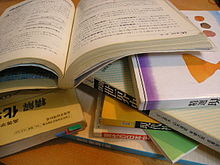Textbook Commission
Internationally staffed textbook commissions are established with the aim of correcting a perspective dominated by one-sided national histories and prejudices through multiple perspectives or the harmonization of textbooks from different countries . As a rule, specialist scientists, specialist didactics and representatives of the education authorities are involved. Your work is documented in textbook recommendations, and in some cases new textbooks are also developed.
Commissions since 1951
These institutions serve an internationally oriented history policy , which is supposed to promote international understanding and reduce enemy images . In Germany, several commissions are based at the Georg Eckert Institute for International Textbook Research , the first one was founded there in 1951 to focus on the Franco-German image of history in textbooks. In the talks between Poland (since 1972), the Czech Republic and Germany, for example, the issues of demarcation ( Oder-Neisse border ), the Sudeten German areas , the expulsions and their classification in the historical context are controversial .
A German-French history book Histoire / Geschichte has been available for the upper school since 2006, which is published in Germany by Ernst Klett Verlag . Despite considerable funding, sales fell short of expectations because the use of a binational textbook encounters many didactic and practical school problems. It was valued more by politicians than by educators. There is hardly anything in it about the history of the GDR and Eastern Europe, which is central to the central exams. It also remains unclear why students should be more interested in French history than, say, in American history. So it is used more as additional material or in the German-French high schools . The German-Polish textbook commission has also developed a concept for a four-volume history book for secondary level I (as of 2020), which was published on the German side by Eduversum Verlag and on the Polish side by Wydawnictwa Szkolne i Pedagogiczne. The first volume from Europe - Our History was presented in 2016 by the then foreign ministers of both countries, Frank-Walter Steinmeier and Witold Waszczykowski .
A German-Israeli textbook commission (for the first time 1981–1985) developed recommendations for the presentation of German-Jewish history. In a study carried out until mid-2015, the German-Israeli textbook commission found that the state of Israel was presented in German textbooks almost exclusively in the context of the Middle East conflict, which led to "shortenings and distortions". She recommends taking up the history of the country with its "democratic and pluralistic traditions" in other contexts in school books from now on.
precursor
The idea of an understanding about the textbook review already existed in the interwar period . At the initiative of the French textbook author Jules Isaac , there were initial talks, but they were not met with approval in Germany. After all, Isaac called an International Conference on History Education in 1931 , which met in The Hague in 1932 and in Basel in 1934 . Then the National Socialist German Reich refused. There was a brief, inconclusive Franco-German aftermath from 1935 to 1937 with Arnold Reimann .
literature
- Joint German-Polish textbook commission (ed.): Textbook history . V&R Unipress, Göttingen 2012, ISBN 978-3-8471-0006-5 (= Georg Eckert Institute for International Textbook Research : Eckert. Expertise , Volume 1).
See also
Web links
- Textbook commissions at the Georg Eckert Institute for International Textbook Research :
- Documents from the German-Polish textbook commission for download
- German-French history book published by Ernst Klett Verlag
- German-Polish history book "Europe - Our History" (project website)
- Publications about textbook commissions at LitDok East Central Europe / Herder Institute (Marburg)
Individual evidence
- ↑ Rainer Riemenschneider: The third generation. Textbook work with France from the perspective of an actor and contemporary witness . In: Bendick, Rainer; Bongertmann, Ulrich u. a. (Ed.): Germany and France - History Lessons for Europe the Franco-German Textbook Discussions in a European Context . Wochenschau, 2018, ISBN 978-3-7344-0598-3 , pp. 60-70 ( worldcat.org [accessed August 20, 2020]).
- ↑ Common history in Europe. Retrieved November 12, 2019 .
- ^ German-Israeli textbook commission: German-Israeli textbook recommendations (2nd edition) , 2016, p. 29 , accessed on October 17, 2018
- ^ German-Israeli textbook commission: German-Israeli textbook recommendations (2nd edition) , 2016, p.37 , accessed on October 17, 2018
- ↑ Rainer Bendick: On the way to "detoxification"? German-French. Textbook conversations in the area of tension between Nazi dictatorship, memory of conflicts and the will to communicate . In: gfh . tape 10 , no. 4 . Wochenschau, 2017, p. 50-59 .
